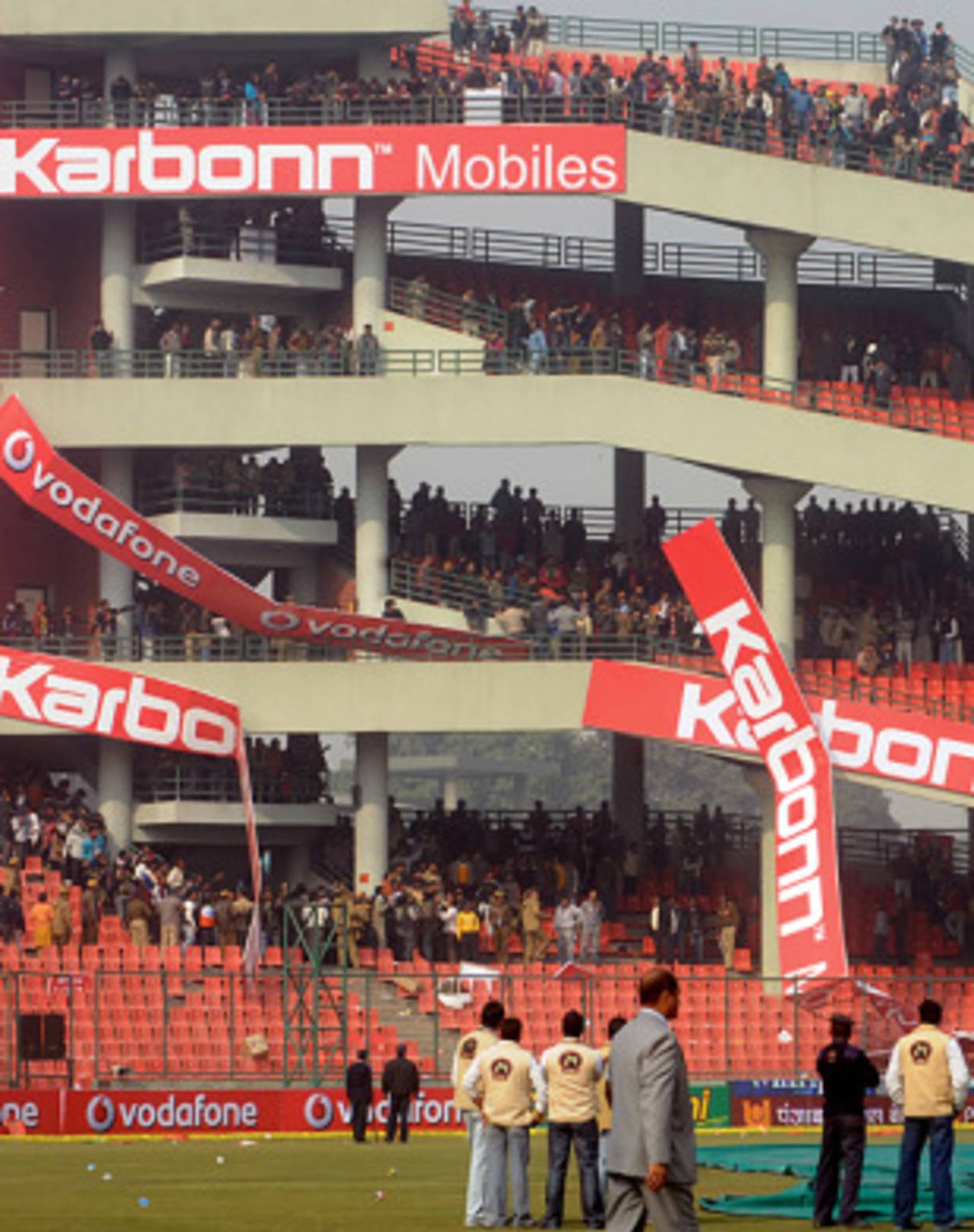Match referee gives harshest assessment of Kotla pitch
The possibility of the Feroz Shah Kotla being disqualified from hosting the 2011 World Cup remains high
Cricinfo staff
29-Dec-2009

The Feroz Shah Kotla's short-term international fate hangs in the balance • AFP
The possibility of the Feroz Shah Kotla being disqualified from hosting the 2011 World Cup remains high after ICC match referee Alan Hurst classified the pitch as "unfit" in his official report to the ICC, which was forwarded to the BCCI. The report was submitted in the aftermath of the abandonment of the fixture between India and Sri Lanka due to a dangerous pitch.
The classification is the harshest among the six stated categories - very good, good, above average, below average, poor and unfit. The venue could have got away with a fine had Hurst classified the surface as "poor" but given his most critical assessment, the consequences could be much worse.
"This pitch did not meet the requirements for an ODI match," Hurst is quoted by the Hindustan Times as saying in his report. "This meant the players were unsure of what the ball would do. Playing shots was risky because of the unpredictable bounce. However, of more concern was the dangerous bounce that occurred randomly and accounted for batsmen being struck on a number of occasions.
"At the other extreme, bounce was often very low. This pitch did not allow players to play with any confidence and was totally unsuitable for international cricket."
The ICC's latest code of conduct regarding poor pitches states that a first such breach should be met with "a suspension of the venue's international status for a period of between 12 and 24 months together with a directive for appropriate remedial action and the need for prior ICC re-accreditation as an international venue".
The BCCI has been given 14 days to respond to Hurst's report. Its reply, in addition to the report, video footage of the abandoned game and other significant documents, will be studied by the ICC's chief referee Ranjan Madugalle and its cricket operations manager Dave Richardson, who will determine the penalty.
In his report, Hurst also enumerated 14 points to chronicle the lead-up to the abandonment. "Early on Saturday morning the fourth umpire Subrat Das went to the ground to check that a number of things were in place. He reported to me that the wicket was quite green in patches, but the Curator had told him that extra rolling during the day would mean that 'the green would turn to brown'. It was still quite green tinged when the umpires and I did our ground inspection later that afternoon," he wrote.
Hurst recorded that the Sri Lanka coach Trevor Bayliss and manager Brendon Kuruppu approached him at two stages during the game - in the tenth and the 24th over -expressing concern over the behaviour of the pitch. The report noted that play had to be stopped on three occasions -- at 9.54am, 10.05am and 10.46am -- for Sri Lanka's batsmen to receive medical treatment after being struck by the ball.
Of all the deliveries that bounced excessively or kept low over 23 overs, the umpires estimated that six were outright dangerous. Following complaints by players, the field umpires Shavir Tarapore and Marais Erasmus consulted Hurst, who walked out onto the field and spoke to the two captains, who agreed the pitch was unfit for play.
"At the edge of the ground I spoke with President DDCA (Delhi & Districts Cricket Association) Mr Arun Jaitley, Mr Narinder Batra DDCA Treasurer, BCCI Hon Secretary Mr Srinavasan, DDCA Vice-President Mr Chetan Chauhan and other local officials. I was asked whether another prepared pitch on the square could be substituted," Hurst said. "I went to the square with Mr Chauhan to look at the option, which had been partially prepared as back-up prior to the game.
Although reasonably hard, it was quite heavily, but unevenly grassed. In keeping with the Playing Conditions, I then spoke with the Captains about this option. Both gave emphatic negatives."
The ICC had warned the DDCA in November about the condition of the pitch and said it required "considerable improvement" before hosting its next fixture. "There is an ODI at this venue on 27th December 2009 and considerable improvement of the pitch block will be required by then to make the pitch provided more acceptable" said the report, a copy of which is with Cricinfo. The inspection was carried out on November 4, three days after third ODI of the India-Australia series.